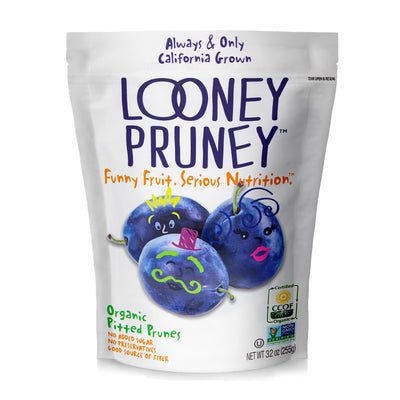Prune Juice for Babies: A Good Way to Relieve Your Baby’s Constipation?
Parents frequently feel powerless and unable to provide their infants with relief when they become constipated. Nothing is more upsetting than witnessing your infant in discomfort or anguish as a result of constipation. You can actually take help of prune juice for babies if you need some assistance in getting things going and want to attempt a natural cure. Prunes work great as a natural laxative. It can help parents relax while also providing relief for babies.
If your infant has been fussy recently and you've observed that they haven't had regular bowel movements or that they have difficulty when they do, they may be experiencing constipation, which is relatively common in children under the age of five. The good news is that making prune juice at home is a simple, quick, and natural option. And it can really be the remedy for your child’s constipation.
Health Benefits of Prune Juice for Babies

Prunes are dried plums that are rich in fiber, natural sugars, and minerals. Constipation can be relieved with sorbitol, a form of sugar that works like a laxative. Prune juice is high in sorbitol and hence beneficial for constipation.
Prunes have a number of advantages that can enhance your health and make up a healthy diet.
- Provides energy- Prunes are a fantastic source of energy and their simple carbohydrates don't create a significant blood sugar increase.
- Source of fiber- The dietary fiber in prunes is excellent. They include soluble fiber, which encourages the absorption of water by the intestine and softens and facilitates the passage of feces. Insoluble fiber, which gives the stool volume and accelerates its movement, is also present in them.
- Vitamins and minerals- Prunes contain a lot of boron. It may help prevent the condition osteoporosis which weakens bones. You can get all the boron you need from one serving of prunes or simple prune juice. Prunes are also rich in potassium, vitamin K, vitamin A, niacin, riboflavin, and vitamin B6, among other vitamins.
- Phenolic substances- The abundance of phenolic chemicals in prunes contributes to their laxative properties. These prune-derived chemicals may be beneficial for maintaining a healthy heart and preventing chronic illnesses.
Prune Juice for Newborn Babies
Younger than two months old are newborns. They frequently strain, cry, groan, and have gas. But this does not always indicate that they are constipated. They may be learning the process of having a bowel movement.
Compared to babies who are fed formula, breastfed newborns may also go longer between bowel movements. A newborn younger than two months old going longer than five days without having a bowel movement is not uncommon.
For people of this age, constipation is uncommon. Consult your child's pediatrician for a checkup if you think your child may be constipated instead of giving them prune juice.
Prune Juice for Infants
Infants range in age from two to twelve months. Even at this stage, you shouldn't offer your infant juice unless your doctor has advised you to. If your baby's pediatrician provides the all-clear, they can advise you on the recommended daily dosage of prune juice for your child. One ounce of prune juice every month of life, with a daily maximum of 4 ounces, is a reasonable general guideline.
Giving them the prune juice no more than twice daily aids in bowel movement relief. To help your infant stay hydrated, you might also wish to dilute the juice with water. Continue nursing or using formula as usual.
Giving your child prune juice using a spoon or in a syringe if they don't use a cup is the best option.
Prune Juice for Toddlers
Your child is regarded as a toddler once they have turned one. Toddlers frequently have constipation, especially when they are first learning to use the bathroom.
When a child is a toddler, prune juice can be administered in higher dosages to treat constipation. But no more than a cup should be consumed daily. Any more could aggravate your child's tummy.
Symptoms of Constipation that Might Require Prune Juice
It is doubtful that it will be necessary because younger infants who are breastfed or bottle fed rarely experience constipation.
Don't be alarmed if your baby goes several days without having a bowel movement; it's quite common. Infrequent bowel motions are one indication of constipation. But there are other symptoms to watch out for, such as:
- The kind of pain that makes your baby cry and arch their back when they pass a stool.
- Long bowel movements are being resisted by your baby.
- Any blood in the stool, as well as any possible bleeding anus tears.
- A stool that is huge in diameter, hard, or dry.
- Any liquid leakage between bowel motions from the anus.
The fact that a baby or toddler is grunting and straining is not always an indication of constipation. Of course, your doctor should be able to provide you with particular guidance if you ever have concerns about your child's bowel movements.
How Much Prune Juice to Give a Baby

Prune juice can be safely administered to kids one year old and older to ease constipation. Although prune juice is generally risk-free and safe, it is not advised for infants younger than 12 months unless your doctor approves. Also, infants younger than six months old should only be fed breast milk, according to the American Academy of Pediatrics (AAP).
Prunes are best introduced to your kid when they are around six months old when you first start introducing foods. Instead of using prune juice, you can feed your infant whole, mashed, or pureed prunes. Whole, pureed prunes will provide both sorbitol and fiber to your baby, easing constipation. They will be able to form healthy eating habits thanks to this.
You can administer two ounces of prune juice along with two ounces of water. But only if your doctor recommends it. The juice should be administered in a cup at mealtimes. But if your child is still too little to drink from a cup, you can administer it via syringe.
How to Make Prune Juice

Prune juice can be a natural medicine to make your child feel a little bit better. Although it might not work for every child. Always start out by giving your infant a modest amount to make sure there are no juice allergies or negative responses. Prune juice is available in most grocery shops. However, if you only need a small amount, it's much easier and less expensive to prepare it yourself. Just make sure to acquire the pasteurized variety. Prunes and water are the only two components required to produce prune juice at home.
Using only water and prunes, you can produce your own prune juice using this recipe from Gk Food Diary. It also includes instructions on how to store the finished product. The prunes are blended with the water in a blender, strained, and done after soaking for 12 to 24 hours. Just like that you have prune juice on hand. To ensure that no clumps of the prunes remain in the juice, you'll want to pay close attention when you strain the prune combination.
You might want to try some homemade prune juice if you're worried that your child has constipation. Do not hesitate to see your doctor if your child continues to experience constipation and discomfort.
Where to Buy Prune Juice
Consider keeping prune juice on hand to relieve constipation if your child is an infant or toddler. The best chance to use it is when you have it in advance.
Prune juice is widely available in grocery and natural food stores. Verify the pasteurization of the prune juice first. Any hazardous bacteria, including Salmonella and E. coli, are eliminated by this process.
Conclusion
Young children who experience constipation may benefit from the safe and efficient home treatment of prune juice. Before introducing prune juice to your child, use caution and see a doctor if they are younger than one year old or have a history of food allergies.
When providing prune juice to your child to help them get their bowels moving again, make sure to measure the dosages out precisely. If they consume too much prune juice, it could overtax their digestive system and make them feel worse.






